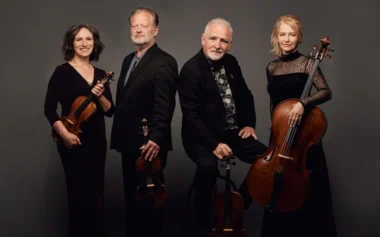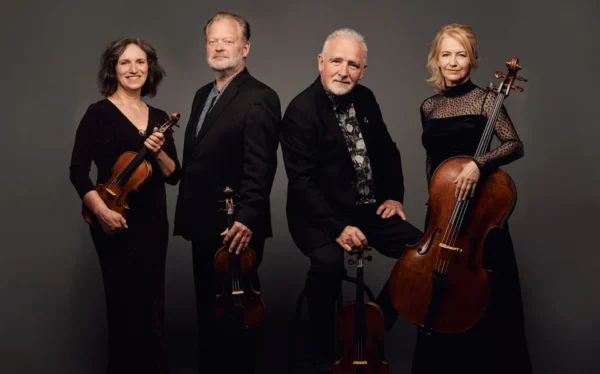 United Kingdom Brodsky Quartet – Shostakovich: Royal Leamington Spa Pump Room. Warwickshire, 28 & 29.9.2024. (CP)
United Kingdom Brodsky Quartet – Shostakovich: Royal Leamington Spa Pump Room. Warwickshire, 28 & 29.9.2024. (CP)

Brodsky Quartet – Krysia Osostowicz – violin, Ian Belton – violin, Paul Cassidy – viola, Jacqueline Thomas – cello
The Brodsky Quartet’s performance of the fifteen string quartets by Dmitri Shostakovich proved to be a lesson in his art of quartet writing! The visit to the historic and once beautiful Royal Leamington Spa Pump Room and Baths, was their sixth visit since 2002 at the request of Leamington Music. They returned in the knowledge their audience would, as always, be a most friendly and knowledgeable one. With an absence of coughs, an absence of dropped programmes and a total absence of mobile phone interruptions, the weekend proved to be a most welcoming event with visitors from across the West Midlands and from further afield. For many attending, the memory of these two days of six concerts will stay with them for the rest of their lives, no doubt marvelling at the stamina of the four players who performed for a total of more than 450 minutes, offering, in addition, anecdotal introductions to each of the fifteen quartets. Such tenacity is to be much admired! As August 2025 will be fifty years since the death of Shostakovich, this foursome deserves to play a large role in any celebrations.
In 1938 Shostakovich teamed up with the Russian Beethoven Quartet, formed in 1922, for a lifetime of collaboration. Quartets Nos. 3 and 5 dedicated to the Beethoven Quartet provide evidence of the composer’s ability to surprise his audiences with the unexpected; a lopsided march in the third movement as an example enjoyed by violinist, Krysia Osostowicz. Nos. 11, 12, 13 and 14 dedicated to individual players of the Beethoven Quartet. These fifteen quartets are a private diary – each quartet would be a chance for the composer to say something personal. Shostakovich identified No.1 as a ‘springtime work’, learning the art of quartet writing; No.2, an experiment in what he had learned from No.1 and, from his collaboration with the Beethoven Quartet, No.3, a truly angry work of five movements perfectly represented by cellist Jaqueline Thomas with bowing to create rumblings of unrest, named in the manner of a war story about the unprecedented catastrophe that was the siege of Leningrad. As Fitzwilliam’s Alan George identifies in his fine programme notes, ‘Why? And for what?’, Shostakovich, although not a Jew himself often gave evidence of his dedication to the Jewish nation – Klezmer music featuring frequently, notably in the folk tune captured so emotively by viola player, Paul Cassidy. During the period of Stalin’s terror, many avoided contact with Jewish people, Shostakovich was not one of them; he offered assistance; indeed, he protested against the imprisonment of Joseph Brodsky, the poet and essayist.
The Brodsky Quartet recently celebrated fifty years at the top of their game, their energy and craftmanship having been recognised across the world. Remarkably, two members, cellist Thomas and violinist Belton, were in at the beginning of the foursome in 1972 in Middlesbrough when they struggled to transcribe Shostakovich scores from radio broadcasts! What an excellent work ethic! By 1992 the decision to play standing up had been implemented, in the belief that they can be much more expressive and, within the group, can be much more communicative; best demonstrated when viola player Cassidy shows how to capture the moods in Quartet No.7, composed in memory of the Shostakovich’s first wife who died in 1954. Cellist Thomas sits on a plinth thereby lifting her eye level closer to the others. They take turns to provide the illuminating anecdotal introductions; Quartet No.4, with its extremely melodic phrasing by Belton in the second movement, was composed in 1949, when the composer was out of favour with the authorities, and not premiered until after the death of Stalin. Boisterous pizzicatos ushered in the last movement with Jewish feeling evident once again in a powerful demonstration of his thinking at the time. Making a change to the chronological order of quartets, Brodsky embarked on No.6 from 1956, a playful work introducing a sense of optimism and happier days, composed whilst on honeymoon with his second wife. This was followed by No.5 as it is considered an epic one, a difficult, complex piece which can endure repeated listening. This is Cassidy’s favourite, and he clearly enjoyed the invigorating rhythms of the first movement and performed a passage of breathtaking defiance in the last movement.
The final concert on Saturday night featured quartets Nos. 7, 8 and 9; Shostakovich ‘showing an astonishing burst of concentrated creativity in completing No.8 in just three days’ according to Alan George. One moment of unexpected drama happened in the performance – violinist Belton snapped a string!! Even more telling was violinist Osostowicz’s observation how this quartet was a tribute to the victims of fascism. If only the Brodsky intense concentration and tenacity could be captured; what a more productive and happier world this would be!
This intensity continued with Nos. 11, 12, 13 and 14 and, for this reason, the four were split into two shorter concerts. Incredibly lyrical writing and explosive moments demanded exquisite timing, showed some humour and evidence of Shostakovich’s interest in Shakespeare! This leaves No.10 as the loner, a standalone work and No.15 considered to be the most perfect way to end a two-day event. No.10’s Allegretto furioso induced most astonishingly powerful playing with stunningly eloquent lyrical moments in the Adagio. With all six movements of No.15, marked Adagio, there is a reminder of Haydn’s The Seven Last Words of Christ. Shostakovich was now a very sick man, unable to complete the 24 quartets he promised the Beethoven Quartet. The premiere, delayed due to a death of a Beethoven Quartet member, was finally delivered in late 1974. Movement six is an epilogue, a poignant reminder of what could have been. Deservedly, the players asked for a long, long silent pause before the audience stood in admiration of a job so very well done. What a weekend!
Clive Peacock

Dear Mr Clive you are by far a mountain/fountain of musical knowledge…